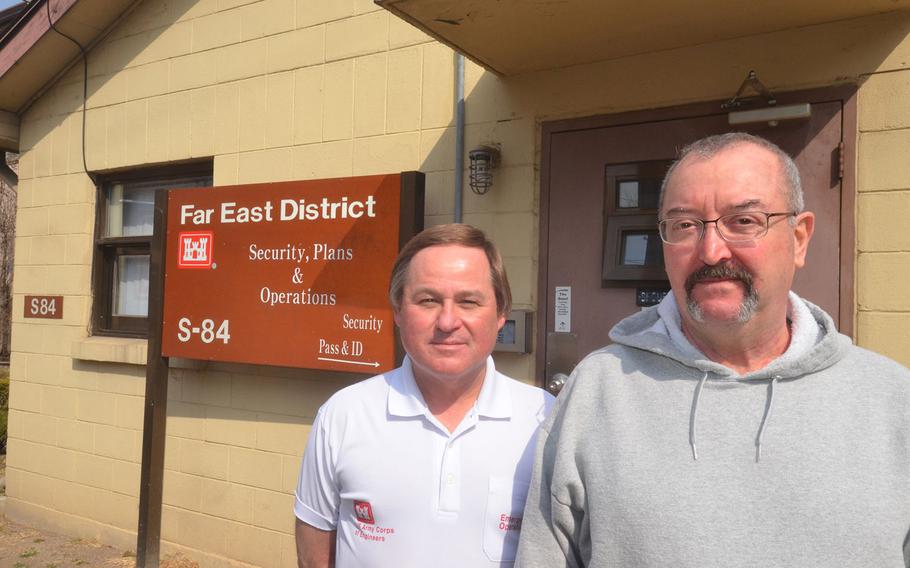
Robert Lamoureux, left, stands with colleague Jerry Giefer outside offices at the Army Corps of Engineers Far East District compound in Seoul. Lamoureux was honored in March by Seoul fire officials for helping save Giefer's life after a heart attack. (Erik Slavin/Stars and Stripes)
As heart attacks go, Jerry Giefer’s timing was impeccable.
Giefer, 64, doesn’t recall much about what happened Dec. 30 at his office at the Army Corps of Engineers compound in Seoul.
One moment he was working and the next, everything went black.
It was 11:30 a.m., and co-worker Robert Lamoureux walked in after his lunch break tofind Giefer on the floor, his head bleeding from the fall.
Lamoureux, who first learned CPR as an 11-year-old Boy Scout, was about to use his training for the first time.
Lamoureux felt a pulse and then turned Giefer over. He asked a co-worker to call for an ambulance and returned his attention to his fallen friend.
Giefer’s face had turned purple, indicating an airway obstruction. Lamoureux cleared Giefer’s mouth and gave him a breath, but Giefer’s chest didn’t rise. He showed no sign of a pulse.
Lamoureux knew that his friend might not survive.
“If I’d have been here a minute later, that would’ve been it,” he said.
Lamoureux began chest compressions, but Giefer showed no response. On the 10th repetition, Giefer coughed up foam, freeing his blocked airway. Every third compression brought a hiccup-like noise, but Giefer remained unconscious.
Lamoureux kept compressing Giefer’s chest for 12 to 20 minutes.
“When I teach Boy Scouts CPR, I tell them that CPR is exhausting,” Lamoureux said. “I never got tired. I had so much adrenaline going.”
South Korean fire department medics showed up and took over, shocking Giefer’s heart three times with a defibrillator. Medics transported him to a government hospital across the street, where he was diagnosed with a completely blocked artery.
After one day in the hospital, he remained unconscious but his vital signs stabilized. Meanwhile, his trip to an out-of-network hospital had resulted in a $13,000 bill.
Giefer needed a transfer to Severance Hospital, which has an agreement with military health care provider Tricare. However, South Korean hospitals don’t typically release patients until their bills are paid.
Giefer’s command stepped in and settled the bill, clearing the way for his transfer. After double bypass surgery and four days in a coma, Giefer woke up and saw Lamoureux by his side.
In April, Giefer reflected on how lucky he was that his heart attack happened where it did, a block from a hospital and with a friend ready and able to keep him alive.
Lamoureux had been practicing for such an unexpected moment for most of his life.
After the Boy Scouts, he kept his skills fresh in the Marine Corps and later as a medic in the Army, where he retired as a reservist sergeant major while working as a police officer in Virginia. He now serves the Corps of Engineers’ Far East District as its emergency management specialist.
“It was a confluence of good fortune for me,” Giefer said. “It couldn’t have worked out better, really.”
In March, Lamoureux was awarded the Heart Saver Hero Award from the Seoul Jungbu Fire Station for his efforts. He became the first foreigner to receive the distinction since the award was created in 2006.
Lamoureux hopes that what transpired will encourage others to learn first aid and CPR, and that those who learned those techniques years ago will revisit them.
“There are so many simple things people can learn,” he said. “You have to keep up the training, because you never know what you’re going to run into.”